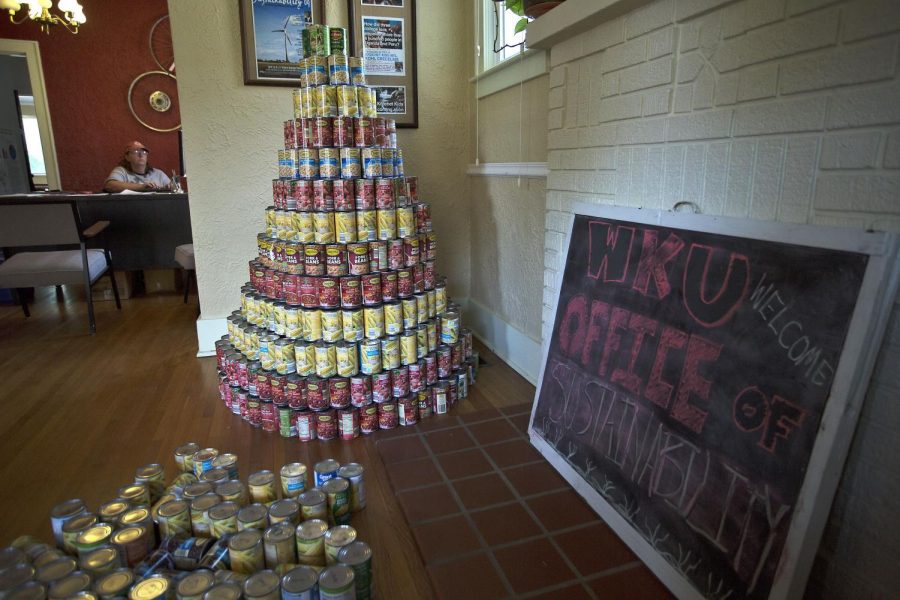Fully Stocked: Food Pantry helps advance food security
May 5, 2015
For many college students, the greatest hardships they will experience, in regard to food, are gaining the freshman 15 or subsisting on a ramen noodle diet for a few days.
Some college students, however, experience the greater hardship of the consistent inability to put any food on their plate each day.
A research study by Western Oregon University reported 59 percent of college students experience food insecurities.
An individual experiences food insecurity when they are consistently unable to obtain adequate food, and thus adequate nutrition, which is essential for academic, emotional and physical health.
According to the American International Journal of Contemporary Research study “Evaluation of Food Insecurity among College Students,” the experience of food insecurity comes from not having enough money to purchase meals or not having time for shopping and preparation.
The study reported that food-insecure students regularly reduce the size of their meals, skip meals or don’t eat at all.
Mark Love, Bowling Green Salvation Army officer, said he noticed an increase in the problem of food insecurity among WKU students recently.
“That need has certainly increased in the past six months a lot,” he said.
The Salvation Army, located on 400 W. Main Avenue, provides a free “mid-day meal” from 11:30 a.m. to 12:30 p.m., Monday to Friday to anyone who is in need.
Individuals in need can also apply to receive food boxes of non-perishable items up to six times a year, but one must qualify by providing an ID and proof of income and expenses.
Love said he believes food insecurity is a rising problem among college students because “food stamps are not going as far. The government programs have actually cut back on food stamps, and the cost of food is rising,” he said. “People get food stamps at the beginning of the month and then it runs out, and they come to us at the end of the month,” he said.
According to the College and University Food Bank Alliance, outside food assistance options, such as the Salvation Army, are not always viable solutions for food insecure students.
“College students often have limited transportation options and community-based food resources are typically not located close to campuses,” the organization’s website states. “Additionally, college students, while food insecure, might not meet community-based agency requirements and/or may be uncomfortable in accessing services off campus.”
Food banks on campus, however, such as the WKU Food Pantry, provide a more accessible option for students.
The WKU Food Pantry is located in the Office of Sustainability on 503 Regents Avenue, and can be accessed Monday through Thursday from 8 a.m. to 12 p.m., or by appointment.
Madonna May, student worker in the Office of Sustainability, said the Food Pantry is available for all students, faculty and staff who are in need.
“If you’re in need of food, there’s no charge for anything,” she said. “You just come in, fill out a piece of paper and take what you need.”
May said the pantry helps many university staff members who are in need.
“There’s quite a few staff who either … just started working or they’re in between paychecks and they just need some food to compensate,” she said.
May said the pantry offers non-perishable canned goods, boxed items and sometimes eggs. She said in a few weeks, food baskets will also include fresh vegetables, such as potatoes, onions and greens, grown in the garden located behind the building.
May said the Food Pantry moved from gender and women’s studies to the Office of Sustainability about a year ago in order to provide these fresh food options.
She said faculty members help harvest vegetables in the garden and sorority and fraternity canned food drives support a large amount of the non-perishable items offered. She said, however, that any donations are still needed and welcome.
Similarly, Love said the Salvation Army requires volunteers to help provide for the growing need in Bowling Green.
According to feedingamerica.org, one in six people in Kentucky struggle with hunger.
“We have a lot of opportunities to volunteer and become aware of that need,” Love said.
Students in need of food assistance can also find resources off campus through the WKU ALIVE Center.


























